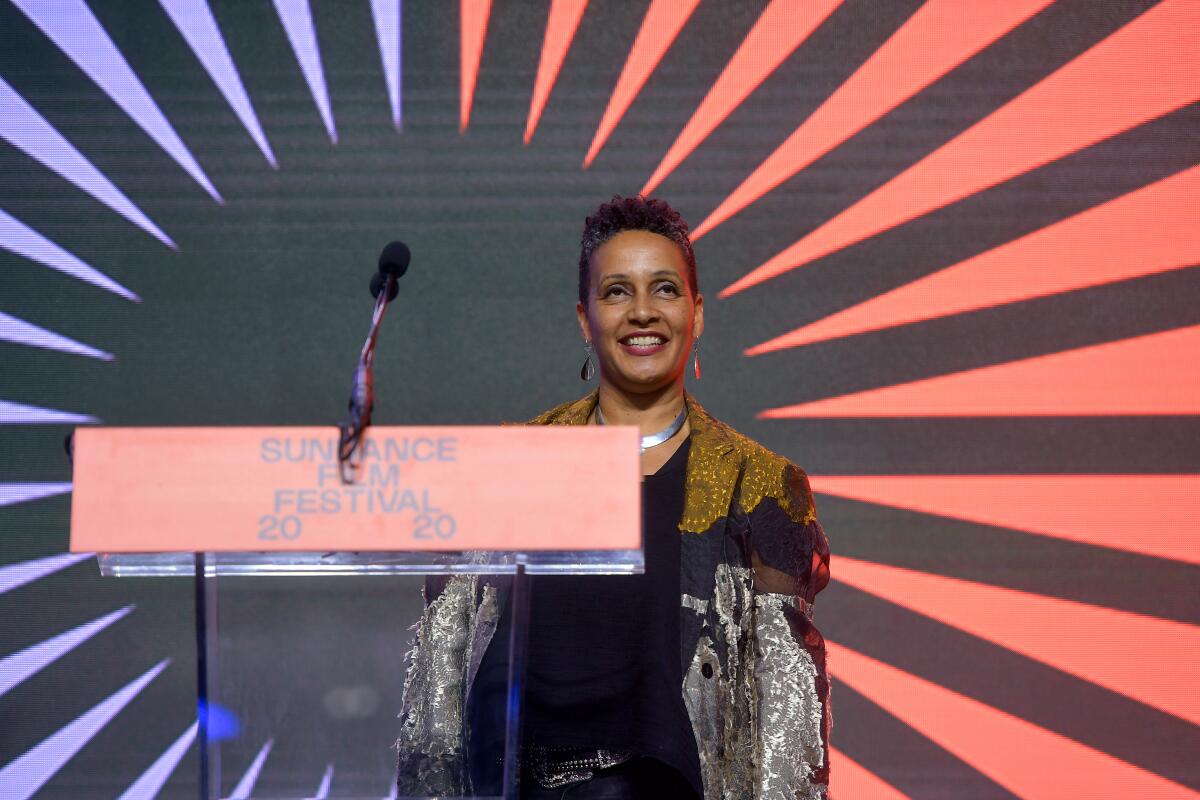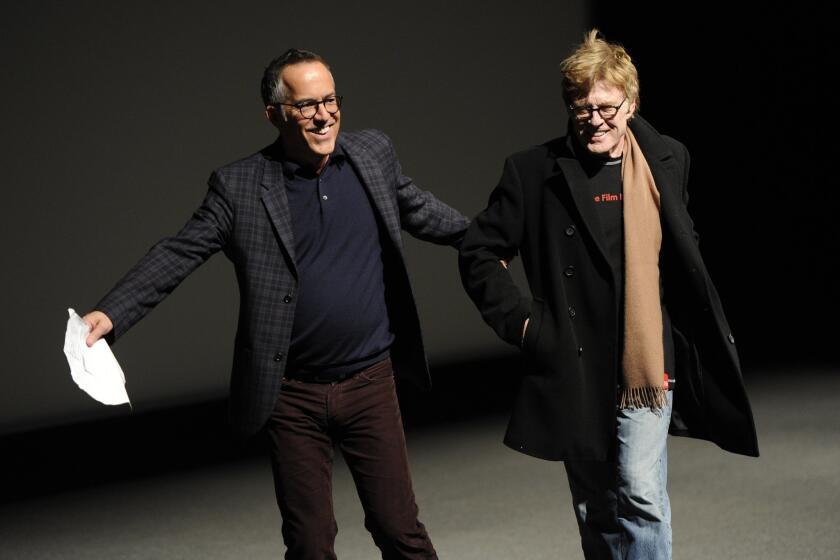Tabitha Jackson makes history as the first female director of Sundance Film Festival

- Share via
PARK CITY, Utah — The Sundance Film Festival made a major announcement at its awards ceremony on Saturday night: Tabitha Jackson will take on the position of festival director. She will replace John Cooper, who has held the position since 2009.
It is a historic hire for the festival: Jackson is the first woman and person of color in the position. She has been director of the documentary film program at Sundance Institute since 2013. Prior to that Jackson was head of arts and performance at Channel 4 television in London.
The position as festival director puts Jackson at the helm of one of the most influential film festivals in the world. The festival is part of the larger Sundance Institute organization founded by Robert Redford in 1981. In an interview at the Sundance Institute offices in Park City earlier this week, Jackson described getting the position as “an out-of-body experience.”
Asked about her vision for the festival, Jackson responded, “Firstly I want to say the festival already is pretty spectacular. But in my interview with Redford, I asked him, what did he want to see in the next festival director? And he said a commitment to independence and an embrace of change. And so those have become my touchstones. And he’s not saying anything different than he did in 1981 when the whole thing kicked off.
“As we exist in this changing media landscape, those touchstones along with the independent voice, that’s going to get us through a lot,” Jackson said. “Apart from Redford, Frank Zappa would be my other key text where he said, ‘without deviation from the norm, progress is not possible.’ So I think that’s what independence is in a sense as well. When we think of the work, it’s about doing something differently. As I think about the festival, the first thing I want to do is to sit with the team and understand what’s possible. ‘What if’ are the two most powerful words in the English language. So I want lots of our discussions with the team to start with ‘what if.’”
It was announced last summer that Cooper would be stepping down as director of the festival and into a newly created position as emeritus director, taking over special projects including preparations for the Institute’s 40th anniversary next year. Keri Putnam, director of the Sundance Institute, put out a public call to fill the festival director position. Some 700 people applied, which was narrowed down to a short list of six to 10 applicants and then finally four finalists. A board committee and a committee of staff members were part of the selection process.
“Tabitha really just consistently emerged for me for a few reasons,” said Putnam in a separate interview. “She really gets our mission and she really gets why we exist in the world. And she asks tough questions about it, so she’s not contented to let that mission just sit where it is today. She looks into the future and she says, how do we achieve this today with where the world is going? What does independent culture need to be successful for the artists, for the culture, for audiences going forward?”
For a festival that is likely best known as a platform for emerging American fiction films and filmmakers, the choice of someone British-born and from the documentary world may seem to be striking off in a new direction. Jackson noted that the majority of submissions to the festival in recent years have come from outside the U.S.
From “Zola” lead Taylour Paige to “Minari” scene-stealer Alan Kim, all the fresh faces who made big impressions at the 2020 Sundance Film Festival.
“There is something very specific about U.S. independent cinema and I have a huge respect for that,” Jackson said. “There’s something in my mind about new American independence, and deliberately American — like the energy around Latinx work, that energy around extraordinary work that’s coming out of Mexico at the moment, the energy around different kinds of groups that might be called new American. There’s something there I want to play with, but not losing the distinctive identity at this festival. And being in the American West, there’s something mythic and historically resonant about what that means.”
In a statement, Redford said, “I founded Sundance Institute with the clear mission of celebrating and supporting independent artists and the festival is the platform where we can showcase their stories. As we approach our 40th anniversary, I’m pleased to have Tabitha lead us as we move into the future and meet the next generation of artists and their stories.”
In separate statements, Cooper and Sundance’s director of programming, Kim Yutani, praised Jackson’s vision and approach to the job, with Yutani singling out Jackson’s “longstanding commitment to authenticity and the artist’s voice.”
John Cooper will move into an emeritus director role after the conclusion of this year’s festival. He shared some of his favorite memories from his years at Sundance.
Jackson took stock of what inspired her to apply for the position in the first place.
“I needed to ask myself the question, ‘Am I the right person to be leading a festival which is about exhibition and curation and a big fun event?’” said Jackson. “And I realized that the reason I’ve done any of the work I’ve done is because I so firmly believe in the arts as yes, a public good, but also a kind of catalyzer for understanding ourselves more for social progress.
“And this festival is the most fun tool, but also one of the most powerful tools that we have at the institute to put forward those values,” Jackson said. “So not to apply for it would be a kind of cowardice in a sense. Like if I really believe that about the arts then I should throw my hat in the ring. So I did.”
Breakout drama “Minari” won two top prizes at the 2020 Sundance Film Festival, where fellow A24 title “Boys State” claimed the documentary crown and Netflix had multiple winners.
More to Read
Only good movies
Get the Indie Focus newsletter, Mark Olsen's weekly guide to the world of cinema.
You may occasionally receive promotional content from the Los Angeles Times.












